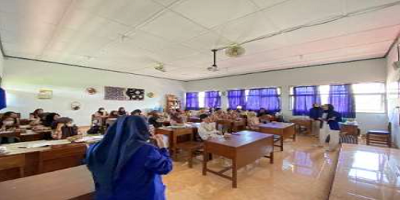EDUKASI DAN PELATIHAN PEMANFAATAN ARTIFICIAL INTELLIGENCE PADA PENDIDIKAN SEKOLAH MENENGAH ATAS DALAM MENGHADAPI ERA DIGITALISASI
DOI:
https://doi.org/10.56606/hikmayo.v3i1.166Keywords:
Artificial Intelligence, Edukasi, PelatihanAbstract
Artificial Intelligence (AI) is a concept related to technological advances in the Industry 4.0 and Society 5.0 era. AI is a computer program that involves integrated machine learning, hardware, and software. This concept is inspired by the neocognitron pattern in the human brain and uses hardware and software science to achieve its function. In the development of Industry 4.0, AI has been widely used in various fields, including education. The aim of this community service activity is to provide education and training to students and educators in the use of Artificial Intelligence to simplify the tasks of educators and provide new learning experiences for students. This activity was attended by 90 students and 20 teachers. Artificial Intelligence education and training activities were carried out at Godean 1 State High School, Sleman Regency, Yogyakarta Special Region. The results of community service activities in the form of Artificial Intelligence education and training for students and teachers are that teachers understand the importance and use of AI in an interesting and enjoyable learning process and students understand the use of AI to assist in the learning process.
Downloads
References
Ayub, M. R. S. S. N., Kristiyanto, W. H., Sudjito, D. N., Noviandini, D., Sudarmi, M., & Santhalia, P. W. (2023). Pembinaan Guru di SMA Swasta Kabupaten Wonosobo: Menuju Pembelajaran Abad 21 Society 5.0. Magistrorum et Scholarium: Jurnal Pengabdian Masyarakat, 3(2), 330–340. https://doi.org/10.24246/jms.v3i22022p330-340
Da`i, M., & Ramadhan, N. (2024). Pelatihan Penyusunan Modul Ajar Kurikulum Merdeka dengan Menggunakan Artifical Intellegence ( AI ) Pendahuluan. 4(1), 21–29.
Efriza, D., Norawati, R., & Arif, N. (2024). DENGAN MENGGUNAAN APLIKASI BERBASIS ARTIFICIAL INTELLIGENCE BAGI GURU SMPN 12 KOTA JAMBI. 3(1), 57–63. https://doi.org/10.37081/adam.v3i1.1709
Kaplan, A., & Haenlein, M. (2019). Siri, Siri, in my hand: Who’s the fairest in the land? On the interpretations, illustrations, and implications of artificial intelligence. Business Horizons, 62(1), 15–25. https://doi.org/10.1016/j.bushor.2018.08.004
Lembaga Tes Masuk Perguruan Tinggi. (2022). Top 1000 sekolah Tahun 2022 Berdasarkan Nilai UTBK. https://ltmpt.ac.id/
Maharani, D., Anggraeni, D., & Nofitri, R. (2024). Pemanfaatan Artificial intelligence dalam Pembuatan Presentasi bagi Guru-Guru Brainfor Islamic School Kisaran. Journal Of Indonesian Social Society (JISS), 2(1), 45–51. https://doi.org/10.59435/jiss.v2i1.219
Sijabat P. I., Nuraisana, Br Barus, E., Sihombing, A., P. (2024). Pengembangan Aplikasi Pintar Berbasis Kecerdasan Buatan (AI) untuk Mendukung Pembelajaran. 2, 58–64.
Smarsly, K., & Dragos, K. (2024). Advancing civil infrastructure assessment through robotic fleets. Internet of Things and Cyber-Physical Systems, 4(August 2023), 138–140. https://doi.org/10.1016/j.iotcps.2023.10.003
Suyitno, S., Wahyuningsih, Y., Febrianti, D., Anisah, A. K., & Wisnu Wardana, A. (2024). Berbagi Praktek Baik Dalam Menyusun Karya Ilmiah Berbasis Artificial Intelligence Melalui Webinar Nasional. Jurnal Pengabdian Kepada Masyarakat Nusantara, 5(1), 836–847. https://doi.org/10.55338/jpkmn.v5i1.2863
Wulandari, P., & Fitrianingsih, D. (2024). Akuntansi 4.0 Dengan Peningkatan Kompetensi Melalui Pelatihan Artificial Intelligence Bagi Siswa- Siswi SMK Jurusan Akuntansi. Jurnal Pengabdian Kepada Masyarakat Nusantara, 5(1), 1041–1049. https://doi.org/10.55338/jpkmn.v5i1.2910



.jpg)
